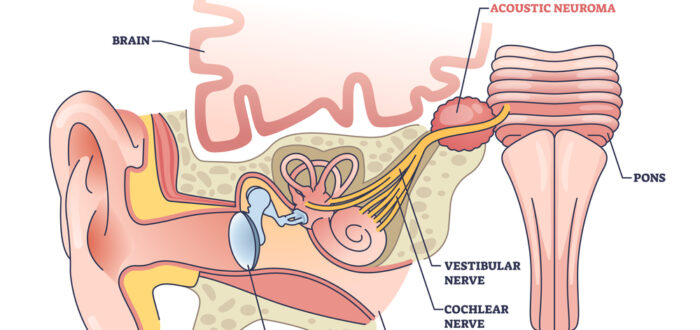Hearing loss can be a challenging condition to deal with, affecting one’s quality of life and interpersonal relationships. Sensorineural hearing loss is the most common type of hearing loss and occurs due to damage to the inner ear.
Several factors can contribute to sensorineural hearing loss, and one of the less common yet significant causes is acoustic neuroma.
Understanding Acoustic Neuroma
Acoustic neuroma, also known as vestibular schwannoma, is a noncancerous tumor that usually develops on the vestibular nerve, which connects the inner ear to the brain. This tumor grows slowly and, though generally benign, can lead to various symptoms, including sensorineural hearing loss.
Sensorineural Hearing Loss and Acoustic Neuroma
Sensorineural hearing loss (SNHL)usually happens gradually. SNHL occurs when there is damage to the delicate hair cells within the inner ear or problems with the auditory nerve pathways to the brain. Since acoustic neuromas grow near the auditory nerve, they can put pressure on it, leading to SNHL.
Here are some key points about how acoustic neuromas can cause sensorineural hearing loss:
- Loss of Hearing: This symptom is usually unilateral, meaning it only occurs on one side. The hearing loss may be partial or complete. Hearing loss usually develops slowly, with the person able to hear all but higher frequency sounds at first. However, partial or complete hearing loss can occur suddenly and intermittently in some cases.
- Tinnitus: An acoustic neuroma can interfere with the hair-like cells in your inner ear that relay auditory signals to the brain. When pressure is placed on these cells, they release random electrical impulses. Your brain interprets these impulses as sound, which causes tinnitus. This condition presents as a ringing, buzzing, whining, humming, clicking, or low roaring in one or both ears with no external source. It can develop slowly, coming and going at first before becoming more constant.
- Imbalance and Dizziness: Alongside hearing loss, patients may also experience balance problems and dizziness due to the tumor’s pressure on the vestibular nerve.
Fortunately, there are several treatment options available for individuals with acoustic neuromas and accompanying sensorineural hearing loss:
- Observation: For small tumors that aren’t causing significant hearing loss or other symptoms, a “wait and watch” approach may be recommended. Regular monitoring with imaging studies can help assess tumor growth.
- Microsurgery: Surgical removal of the tumor is an option for patients with larger tumors or those experiencing severe symptoms. The goal of surgery is to preserve hearing whenever possible, but complete tumor removal may sometimes result in hearing loss.
- Stereotactic Radiosurgery: This non-invasive procedure uses precise radiation to target the tumor and slow its growth. While it may not restore hearing, it can help preserve existing hearing.
- Hearing Rehabilitation: Audiologists play a crucial role in helping patients adapt to hearing loss caused by acoustic neuromas. They can recommend hearing aids or assistive listening devices to improve communication.
Acoustic neuroma can indeed cause sensorineural hearing loss, primarily affecting one ear and often impacting high-frequency sounds. If you or someone you know is experiencing hearing difficulties along with other symptoms like tinnitus or imbalance, it’s essential to seek a prompt medical evaluation.
A diagnosis and early intervention can help manage the condition effectively and improve the quality of life for individuals affected by this benign tumor. Always consult with a healthcare professional or audiologist for proper diagnosis and treatment options tailored to your specific needs.
Need Help? Have a Question? Contact Us Today!
At the Regional Hearing & Balance Center, your health and well-being are our top priority. If you have more questions or concerns about the compatibility of hearing aids with pacemakers or any other hearing-related matters, don’t hesitate to reach out to our expert team. Call us at 208-497-3596 or click here to book a complimentary hearing assessment.


Recent Comments